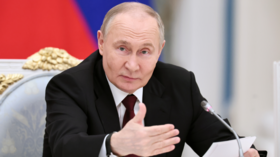Serbia to elect new parliament

Serbia is preparing to elect a new parliament on Sunday. The main rivals are the Radicals and the Democrats. Among the issues that dominate both platforms are the status of Kosovo and EU membership.
Experts in Belgrade say that the campaigning for Serbia's first parliamentary election as an independent state have been quite boring. All parties gave similar promises – fight against corruption and prosperity of the country. 20 movements have registered as candidates in the election, but, according to analysts, the real fight for power is on between the current ruling party, the Serbian democrats, and Nationalist Radicals.One of the most burning issues in Serbia now is the fate of the Kosovo region, since claims for independence are being heard from the land. In 1999 the UN placed Kosovo under its full protectorate and governance. Officially, Serbia's sovereignty over the region remains. In practice it has no power over there. Many believe that in 2007 it will be decided whether or not Kosovo has to be independent. However, both main competitors for seats in the Serbian parliament insist that Kosovo must remain as a part of Serbia. That’s one of the reasons why Albanians in the region will snub the upcoming voting.Another issue is Serbia's accession to the European Union, something the country has been striving for since Slobodan Milosevic's regime was overthrown. In this the parties’ platforms differ.Tomislav Nikolic is running the radical party, while its founder and leader Voislav Sheshel is held in The Hague tribunal charged with war crimes. Nikolic believes that Serbia's economy needs to be in the EU, but not under the current political conditions.“We saw how the European democracy was enforced in Kosovo. Bomb after bomb fell on the land. That’s why our party does not have full support for the accession to the Union. And if the EU says that Kosovo must be independent, then we don’t need such a Union,” he declares.There's a different mood in the democratic camp, where entering the EU is set as a priority. Bojidar Djelic is one of the party's leading figures, next to its leader Boris Tadic, the country's president. If democrats win, he'll be elected prime minister. And his rhetoric seem to be quite confident. “Romania and Bulgaria were less developed than Yugoslavia in 1990. But they progressed, while we had catastrophe. Serbia lost half of its economy, but we lost so much time that is why we're not there. But we need to go forward and we will certainly be able to join the EU,” he says.Independent experts in Belgrade believe the election is unlikely to alter the structure of the government. But they say, if radicals come to power one way or another, it will be a catastrophe for Serbia. “The line which the party is trying to sell right now is essentially the line of Milosevic. There would be an immediate threat of conflict in Kosovo with radicals at power, the reforms would be stopped and Serbia would probably again enter international isolation because no respectable politician wants to talk to a government if its headed by a party whose leader is under trial for crimes against humanity,” claims Dejan Anastasijevic, Serbian journalist.For weeks all eyes of the Serbian people had been focused on the candidates and campaigns. Now the time has come to make the choice. And in what many here describe as the most crucial year in the modern Serbian history there's one question on everyone's mind – could this be a new start for Serbia.
You can share this story on social media:











